Filter by
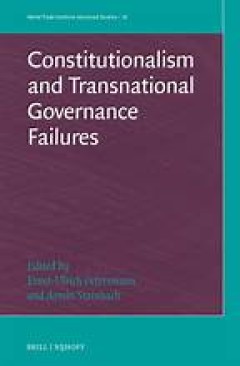
Constitutionalism and Transnational Governance Failures
This book explores strategies for limiting transnational market failures, governance failures and constitutional failures impeding protection of the universally agreed sustainable development goals like climate change mitigation and access to justice and transnational rule-of-law. Can multilevel democratic and judicial protection of fundamental rights and public goods across frontiers be extend…
- Edition
- -
- ISBN/ISSN
- 978-90-04-69372-2
- Collation
- oer.unej.ac.id
- Series Title
- World Trade Institute Advanced Studies, Volume: 16
- Call Number
- -
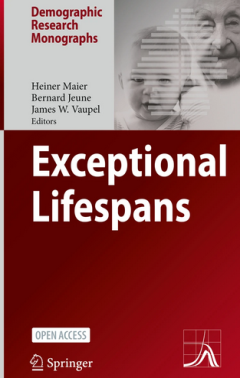
Exceptional Lifespans
Seberapa lama manusia dapat hidup? Buku akses terbuka ini mendokumentasikan, memverifikasi, dan menghidupkan kemajuan perbatasan kelangsungan hidup manusia. Buku ini dengan hati-hati memvalidasi data tentang supercentenarian, yang berusia 110 tahun ke atas, dan semi-supercentenarian, yang berusia 105-109 tahun, yang disimpan dalam Basis Data Internasional tentang Umur Panjang (IDL). Bab-bab dal…
- Edition
- -
- ISBN/ISSN
- 978-3-030-49970-9
- Collation
- online resource ( VII, 344 Pages)
- Series Title
- Monografi Penelitian Kependudukan (DEMOGRAPHIC)
- Call Number
- 620.0042 MAI e
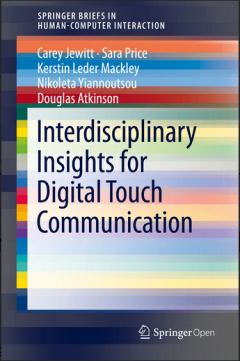
Interdisciplinary Insights for Digital Touch Communication
Komunikasi semakin bergerak melampaui 'cara melihat' ke 'cara merasakan'. Buku Akses Terbuka ini memberikan wawasan dan implikasi desain sosial untuk penelitian dan desain HCI yang mengeksplorasi komunikasi sentuh yang dimediasi secara digital. Buku ini menawarkan peta berorientasi sosial untuk membantu menavigasi lanskap sosial yang kompleks dari sentuhan yang dimediasi secara digital untuk k…
- Edition
- -
- ISBN/ISSN
- 978-3-030-24564-1
- Collation
- online resource ( XVII, 131 Pages)
- Series Title
- Seri Interaksi Manusia-Komputer (HCIS)
- Call Number
- 004.019 PRI i

Aquaponics Food Production Systems = Combined Aquaculture and Hydroponic Prod…
This open access book, written by world experts in aquaponics and related technologies, provides the authoritative and comprehensive overview of the key aquaculture and hydroponic and other integrated systems, socio-economic and environmental aspects. Aquaponic systems, which combine aquaculture and vegetable food production offer alternative technology solutions for a world that is increasingl…
- Edition
- 1
- ISBN/ISSN
- 9783030159436
- Collation
- XVI, 619 hlm ill; lamp
- Series Title
- -
- Call Number
- -
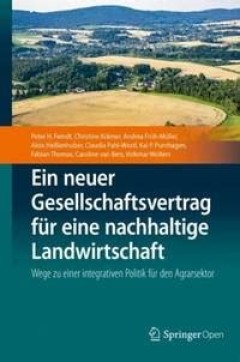
Ein neuer Gesellschaftsvertrag für eine nachhaltige Landwirtschaft = Wege zu…
Die Landwirtschaft in Deutschland, Europa und weltweit befindet sich in einem dramatischen Umbruchprozess. Einerseits bieten Liberalisierung und Marktöffnung, neue technologische Entwicklungen, die wachsende Weltbevölkerung und neue Kundenwünsche vielen landwirtschaftlichen Betrieben neue Möglichkeiten. Andererseits stehen viele Landwirtinnen und Landwirte in internationaler Konkurrenz, sin…
- Edition
- 1
- ISBN/ISSN
- 9783662586563
- Collation
- XX, 323 hlm; ill., lamp.,
- Series Title
- -
- Call Number
- -

Global Citizenship Education = Critical and International Perspectives
This open access book takes a critical and international perspective to the mainstreaming of the Global Citizenship Concept and analyses the key issues regarding global citizenship education across the world. In that respect, it addresses a pressing need to provide further conceptual input and to open global citizenship agendas to diversity and indigeneity. Social and political changes brought…
- Edition
- 1
- ISBN/ISSN
- 9783030446178
- Collation
- XIV, 217 hlm; ill., lamp.,
- Series Title
- -
- Call Number
- -

Sustainable Qatar : Social, Political and Environmental Perspectives
This open access book provides a topical overview of the key sustainability issues in Qatar, focusing on environmental sustainability from a socio-political perspective. The transition to a sustainable Qatar requires engagement with diverse areas of social-political, human, and environmental development. On the environmental aspects, the contributors address climate change, food security, water…
- Edition
- 1
- ISBN/ISSN
- 9789811973987
- Collation
- XIII, 380: ill; lamp
- Series Title
- 9
- Call Number
- -

Rescaling Sustainability Transitions = Unfolding the Spatialities of Power Re…
This Open Access book explores sustainability transitions with a focus on their influence on the relationships between cores and peripheries, the rural and the urban, and the large and the small-scale. The societal changes induced by sustainability transitions are expected to assemble as a variegated and heterogeneous process reproduced by different spatial contexts and scales. Hence, the pract…
- Edition
- 1
- ISBN/ISSN
- 9783031699184
- Collation
- XVII, 299 hlm; ill., lamp.,
- Series Title
- -
- Call Number
- -
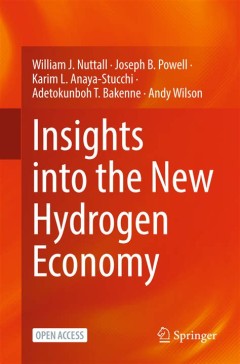
Insights into the New Hydrogen Economy
This open access book offers a comprehensive exploration of the future of the hydrogen industry. It builds upon insights gathered from a series of expert workshops and follow-on activity. International experts from various fields, including industry, public policy, and academia, engaged in dialogue and knowledge exchange, resulting in invaluable findings and observations. This book builds upon…
- Edition
- 1
- ISBN/ISSN
- 9783031718335
- Collation
- XXIX, 162 hlm; ill., lamp.,
- Series Title
- -
- Call Number
- -

Stakeholder Relationships And Sustainability = The Case Of Health Aid To The …
This open-access book analyses how stakeholder relationships impact the sustainability of health aid. It does this by providing an overarching analytical framework, which allows for a systematic analysis of sustainability, relationships, and a possible causal link between these phenomena. The book goes beyond universal paradigms and detailed single-case studies by offering a thorough analysis o…
- Edition
- 1
- ISBN/ISSN
- 9783031319907
- Collation
- XXV, 381 ill; lamp
- Series Title
- -
- Call Number
- -
 Computer Science, Information & General Works
Computer Science, Information & General Works  Philosophy & Psychology
Philosophy & Psychology  Religion
Religion  Social Sciences
Social Sciences  Language
Language  Pure Science
Pure Science  Applied Sciences
Applied Sciences  Art & Recreation
Art & Recreation  Literature
Literature  History & Geography
History & Geography